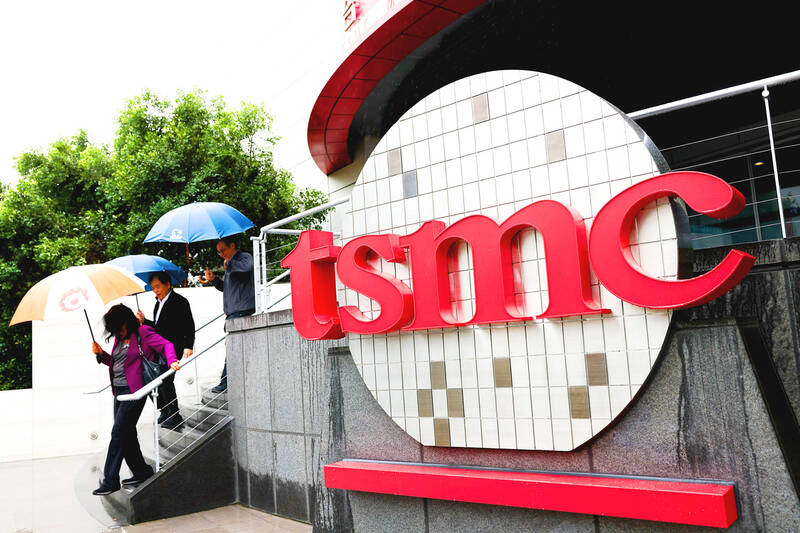With Taiwan Semiconductor Manufacturing Co (TSMC, 台積電) pouring large funds into Arizona, the US is expected to see an improvement in its status to become the second-largest maker of advanced semiconductors in 2027, Taipei-based market researcher TrendForce Corp (集邦科技) said in a report last week.
TrendForce estimates the US would account for a 21 percent share in the global advanced integrated circuit (IC) production market by 2027, sharply up from the current 9 percent, as TSMC is investing US$65 billion to build three wafer fabs in Arizona, the report said.
TrendForce defined the advanced chipmaking processes as the 7-nanometer process or more sophisticated technologies.

Photo: I-Hwa CHENG / AFP
The 3nm process is the latest technology TSMC has launched, with mass production in Tainan, while the chipmaker is developing the more sophisticated 2nm and even 1.4nm processes.
For Taiwan, its share of advanced IC processes in the global market is expected to fall to 54 percent in 2027 from the current 71 percent, although the country would retain the number one spot in 2027, the report said.
South Korea is likely to see its market share fall to 9 percent in 2027 from the current 11 percent, with its ranking expected to fall to third place from the current second, it said.
TSMC is building two advanced fabs in Arizona.
The first is scheduled to start mass production using its 4nm process in early next year, while the second is slated to mass-produce wafers using the 3nm and 2nm processes in 2028.
The company also plans to build a third fab in Arizona using the 2nm process or more advanced technology, with production slated to start by the end of 2030.
Ray Yang (楊瑞臨), an international strategy development consulting director at the government-sponsored Industrial Technology Research Institute (ITRI, 工業技術研究院), said after US president-elect Donald Trump returns to the White House in January, the US government is expected to further push for “Made in America” initiatives by cutting business taxes and raising tariffs to build a more comprehensive semiconductor ecosystem.
According to a projection made by the Boston Consulting Group, the US would triple its domestic semiconductor manufacturing capacity in 2032 compared with 2022, when the CHIPS and Science Act went into effect.
The consulting firm also projected capital expenditure in semiconductors in the US would account for more than one-quarter, or 28 percent, of the global total between next year and 2032.

MULTIFACETED: A task force has analyzed possible scenarios and created responses to assist domestic industries in dealing with US tariffs, the economics minister said The Executive Yuan is tomorrow to announce countermeasures to US President Donald Trump’s planned reciprocal tariffs, although the details of the plan would not be made public until Monday next week, Minister of Economic Affairs J.W. Kuo (郭智輝) said yesterday. The Cabinet established an economic and trade task force in November last year to deal with US trade and tariff related issues, Kuo told reporters outside the legislature in Taipei. The task force has been analyzing and evaluating all kinds of scenarios to identify suitable responses and determine how best to assist domestic industries in managing the effects of Trump’s tariffs, he

TIGHT-LIPPED: UMC said it had no merger plans at the moment, after Nikkei Asia reported that the firm and GlobalFoundries were considering restarting merger talks United Microelectronics Corp (UMC, 聯電), the world’s No. 4 contract chipmaker, yesterday launched a new US$5 billion 12-inch chip factory in Singapore as part of its latest effort to diversify its manufacturing footprint amid growing geopolitical risks. The new factory, adjacent to UMC’s existing Singapore fab in the Pasir Res Wafer Fab Park, is scheduled to enter volume production next year, utilizing mature 22-nanometer and 28-nanometer process technologies, UMC said in a statement. The company plans to invest US$5 billion during the first phase of the new fab, which would have an installed capacity of 30,000 12-inch wafers per month, it said. The

‘SWASTICAR’: Tesla CEO Elon Musk’s close association with Donald Trump has prompted opponents to brand him a ‘Nazi’ and resulted in a dramatic drop in sales Demonstrators descended on Tesla Inc dealerships across the US, and in Europe and Canada on Saturday to protest company chief Elon Musk, who has amassed extraordinary power as a top adviser to US President Donald Trump. Waving signs with messages such as “Musk is stealing our money” and “Reclaim our country,” the protests largely took place peacefully following fiery episodes of vandalism on Tesla vehicles, dealerships and other facilities in recent weeks that US officials have denounced as terrorism. Hundreds rallied on Saturday outside the Tesla dealership in Manhattan. Some blasted Musk, the world’s richest man, while others demanded the shuttering of his

Taiwan’s official purchasing managers’ index (PMI) last month rose 0.2 percentage points to 54.2, in a second consecutive month of expansion, thanks to front-loading demand intended to avoid potential US tariff hikes, the Chung-Hua Institution for Economic Research (CIER, 中華經濟研究院) said yesterday. While short-term demand appeared robust, uncertainties rose due to US President Donald Trump’s unpredictable trade policy, CIER president Lien Hsien-ming (連賢明) told a news conference in Taipei. Taiwan’s economy this year would be characterized by high-level fluctuations and the volatility would be wilder than most expect, Lien said Demand for electronics, particularly semiconductors, continues to benefit from US technology giants’ effort